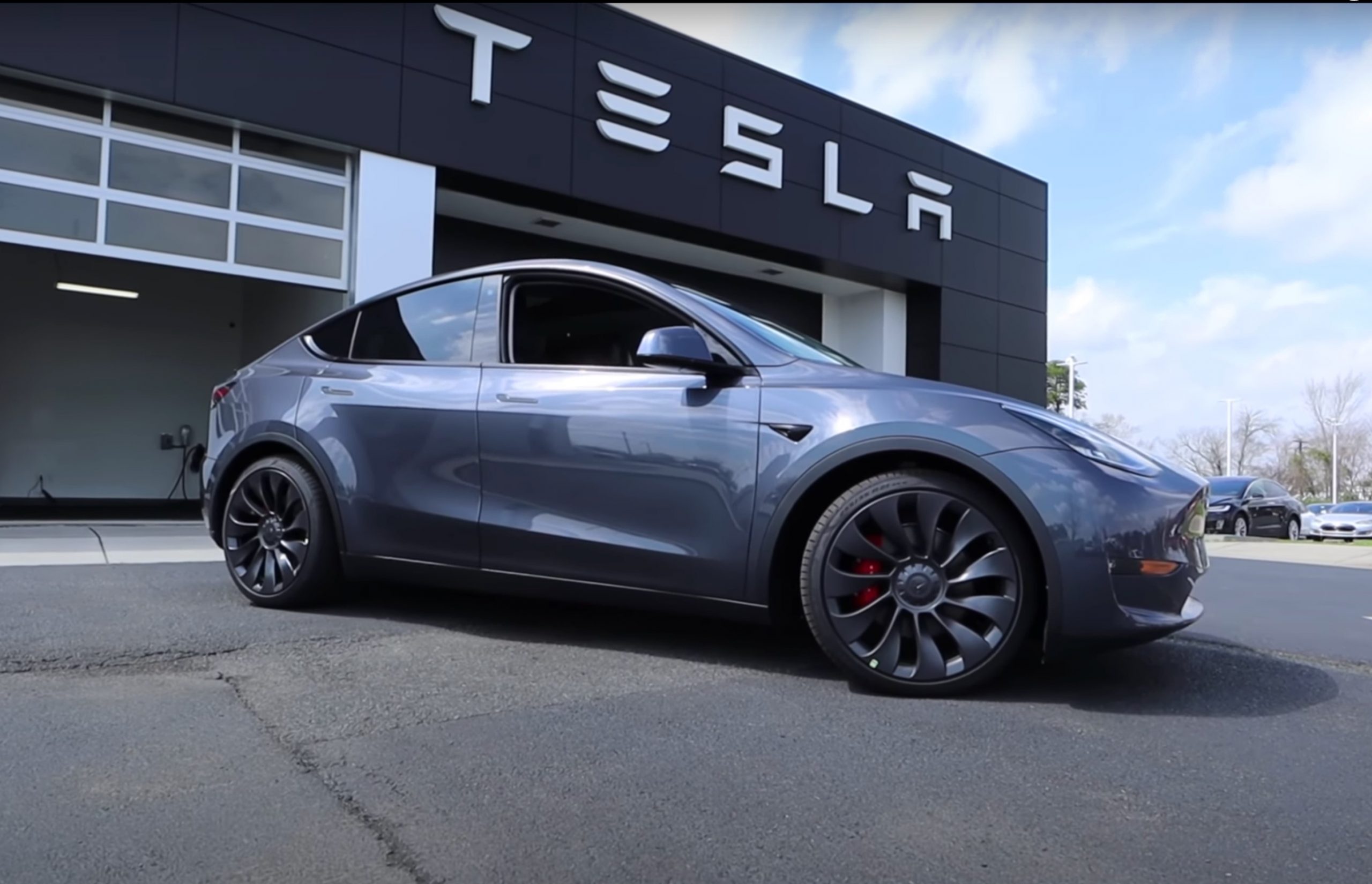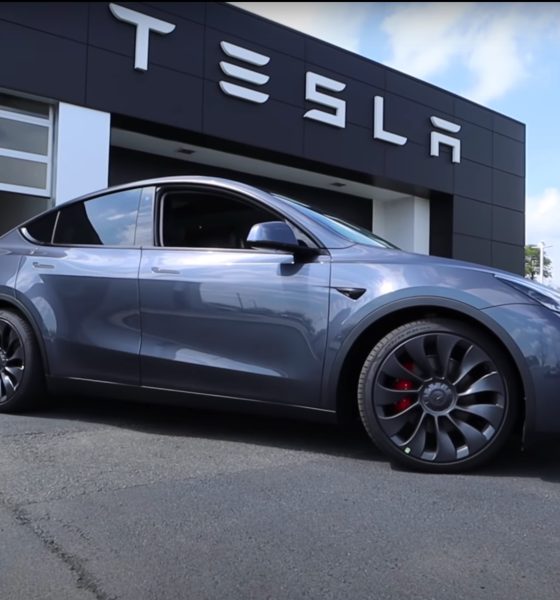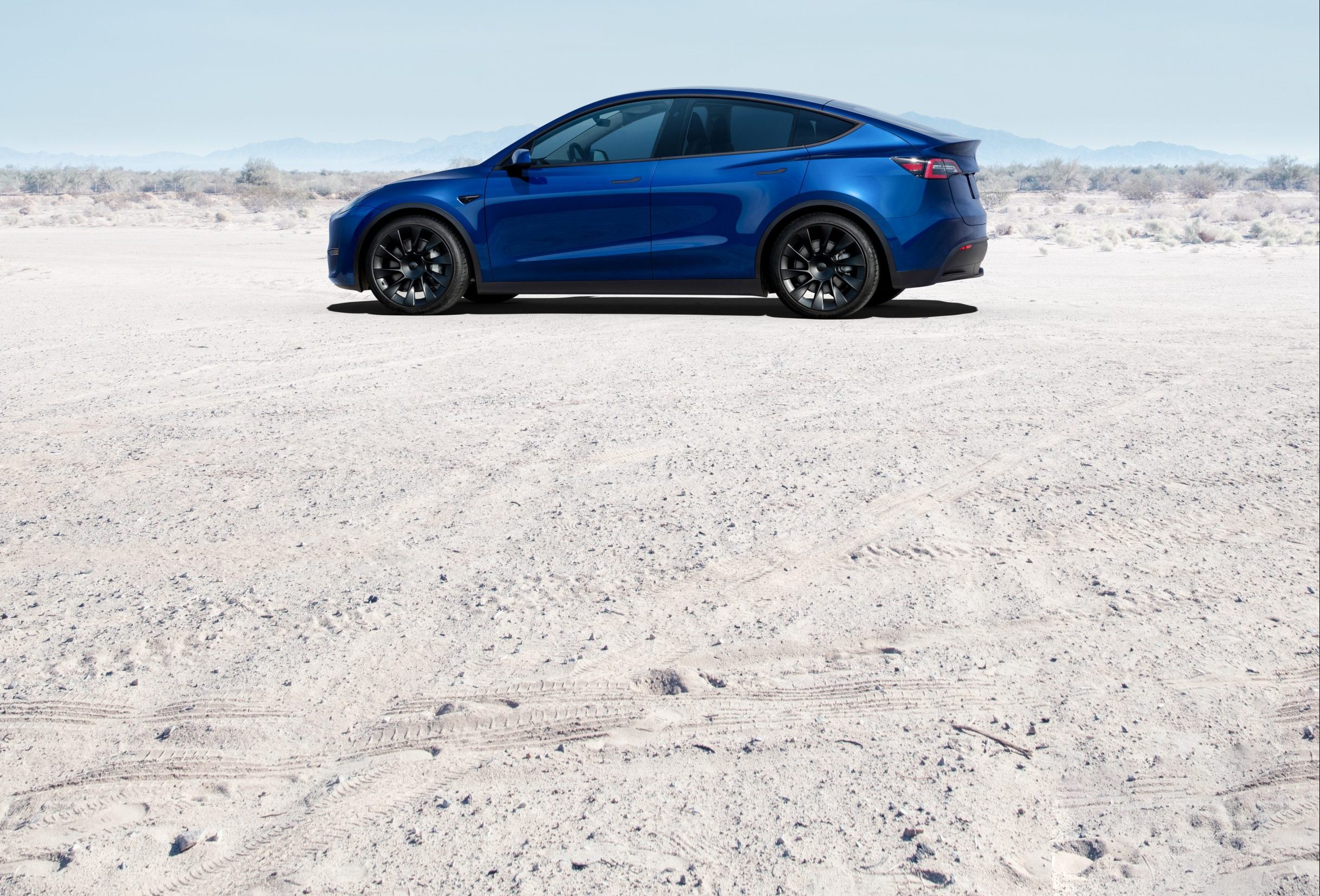

News
Why Tesla Model Y tax credit inclusion is good for some and bad for others
The Tesla Model Y complete lineup was recently added to the IRS list of qualifying vehicles that will give buyers a $7,500 tax credit. While it may seem like the company’s huge price cuts coupled with the tax credit would be good for everyone, it spells bad news for competitors that offer comparable EVs in the same category.
On Friday, the Model Y’s entire lineup was added to the list of qualifying vehicles after the U.S. Department of Treasury said, “The change will allow crossover vehicles that share similar features to be treated consistently.” The Model Y’s five-seat configurations did not reach the weight requirement to be considered SUVs and were put in another category that included “All Other Vehicles.” The price limit to qualify for the tax credit differs by $25,000: $55,000 for All Others, and $80,000 for SUVs.
Tesla Model Y’s complete lineup now qualifies for EV tax credits through Inflation Reduction Act
The inclusion is obviously a good thing for consumers, and events that transpired afterward are good for the investors. With Tesla’s $13,000 price cut on Model Y configurations in early January, the automaker had quadrupled the vehicle’s addressable market. At the same time, it had offered a substantial discount to some who could already justify the purchase, and if they were on the fence, there’s no denying that this inevitably won them over.
Lower prices mean more sales. The Model Y was already making waves in terms of Tesla’s total concentration of sales by model, and it has routinely competed with the Model 3 in various markets and won in many of them. However, the cuts meant Tesla would have to eat some of its margins, which were incredibly high, trailing only Ferrari and BMW in that category. Analysts and more hellbent investors who are obsessed with the company making as much money as possible may not have loved the price cuts, and Tesla obviously will not be making as much of a profit per vehicle. However, on Saturday, following the Model Y’s inclusion to the qualifying vehicles list, Tesla bumped up prices by $1,500.
Is it the $13,000 the automaker trimmed in January? No, absolutely not. But Tesla is already making considerable money on each unit, and the company’s industry-leading tech and Supercharging network are inevitably what will win consumers over, especially as the vehicle is still vastly more affordable than before. With Tesla reaching 1.313 million deliveries last year in 2022, the company has pulled out all the stops to get sales figures off to a fast start in 2023, with various discounts and other programs to push vehicles out the door.
Credit: Tesla
The old saying goes that one’s trash is another’s treasure, and in this instance, the competition is getting the trash while consumers are getting the treasure. Tesla’s massive price cuts and now qualifying tax credits make it a pretty simple choice for consumers. Without a doubt, one of the biggest issues with EV ownership, or at least in the broad consensus of the average consumer, is “Where will I charge my EV?” While this question still makes me chuckle to myself and want to say, “That thing you live in can do it. You know? Your house?” It’s much more complex than that.
A charging network is really what sets Tesla apart from the others. Some consumers may have been willing to spend a little extra to have the confidence that they could be surrounded by charging options, and Tesla is really the only automaker that has such broad options in terms of charging that it really doesn’t have a current competitor. If Tesla does end up opening up its network to other EVs, then this conversation changes. Of course, other companies out there have a robust infrastructure that is quickly growing. Still, these companies are often plagued by maintenance issues, rising costs, and a less-than-desirable experience.
Tesla is already controlling a majority of the U.S. market for electric vehicles, and there are worthy competitors. Volkswagen, Ford, and General Motors all have a wide variety of strategies in their plans to dethrone Tesla. Meanwhile, Polestar, Rivian, Lucid, and other startups are still working through their issues, which are usually money-related.
Tesla is well ahead of the curve, especially as it has already figured out mass production and launched a lineup of competitive vehicles with plans of more styles and applications to come. The inclusion of the Model Y, which CEO Elon Musk believes will be the best-selling car in the world one day, to the tax credit program only spells disaster for the companies attempting to catch up. Meanwhile, Tesla sits comfortably in the driver’s seat, and there does not seem to be any true comparison in current sight.
Disclosure: Joey Klender does own Tesla stock.
I’d love to hear from you! If you have any comments, concerns, or questions, please email me at joey@teslarati.com. You can also reach me on Twitter @KlenderJoey, or if you have news tips, you can email us at tips@teslarati.com.

News
Tesla ships out update that brings massive change to two big features
“This change only updates the name of certain features and text in your vehicle,” the company wrote in Release Notes for the update, “and does not change the way your features behave.”

Tesla has shipped out an update for its vehicles that was caused specifically by a California lawsuit that threatened the company’s ability to sell cars because of how it named its driver assistance suite.
Tesla shipped out Software Update 2026.2.9 starting last week; we received it already, and it only brings a few minor changes, mostly related to how things are referenced.
“This change only updates the name of certain features and text in your vehicle,” the company wrote in Release Notes for the update, “and does not change the way your features behave.”
The following changes came to Tesla vehicles in the update:
- Navigate on Autopilot has now been renamed to Navigate on Autosteer
- FSD Computer has been renamed to AI Computer
Tesla faced a 30-day sales suspension in California after the state’s Department of Motor Vehicles stated the company had to come into compliance regarding the marketing of its automated driving features.
The agency confirmed on February 18 that it had taken a “corrective action” to resolve the issue. That corrective action was renaming certain parts of its ADAS.
Tesla discontinued its standalone Autopilot offering in January and ramped up the marketing of Full Self-Driving Supervised. Tesla had said on X that the issue with naming “was a ‘consumer protection’ order about the use of the term ‘Autopilot’ in a case where not one single customer came forward to say there’s a problem.”
This was a “consumer protection” order about the use of the term “Autopilot” in a case where not one single customer came forward to say there’s a problem.
Sales in California will continue uninterrupted.
— Tesla North America (@tesla_na) December 17, 2025
It is now compliant with the wishes of the California DMV, and we’re all dealing with it now.
This was the first primary dispute over the terminology of Full Self-Driving, but it has undergone some scrutiny at the federal level, as some government officials have claimed the suite has “deceptive” names. Previous Transportation Secretary Pete Buttigieg was one of those federal-level employees who had an issue with the names “Autopilot” and “Full Self-Driving.”
Tesla sued the California DMV over the ruling last week.
News
Tesla workers push back against Giga Berlin unionization
“IG Metall did not succeed in Giga Berlin‘s works council election earlier today. The union share was reduced from nearly 40% in 2024 to 31% in 2026! This is a clear message by the Giga Berlin team towards an independent co-determination! The list called Giga United, led by the current chairwoman, Michaela Schmitz, received the most votes with more than 40%! Good news for Giga Berlin!”

Tesla workers pushed back against unionization efforts at Gigafactory Berlin, and over the past few years, there has been a dramatic decrease in interest to unionize at the German plant.
Gigafactory Berlin Plant Manager André Thierig announced on Wednesday that IG Metall, the European union group, saw its share reduce from 40 to 31 percent in 2026 as employees eligible to vote on the issue. Instead, the Giga Berlin team, known as Giga United, received the most votes with more than 40 percent.
BREAKING! 🚨
IG Metall did not succeed in Giga Berlin‘s works council election earlier today. The union share was reduced from nearly 40% in 2024 to 31% in 2026!
This is a clear message by theGiga Berlin team towards an independent co-determination!
The list called Giga…
— André Thierig (@AndrThie) March 4, 2026
Thierig gave specific details in a post on X:
“IG Metall did not succeed in Giga Berlin‘s works council election earlier today. The union share was reduced from nearly 40% in 2024 to 31% in 2026! This is a clear message by the Giga Berlin team towards an independent co-determination! The list called Giga United, led by the current chairwoman, Michaela Schmitz, received the most votes with more than 40%! Good news for Giga Berlin!”
There were over 10,700 total employees who were eligible to vote, with 87 percent of them turning out to cast what they wanted. There were three key outcomes: Giga United, IG Metall, and other notable groups, with the most popular being the Polish Initiative.
The 37-seat council remains dominated by non-unionized representatives, preserving Giga Berlin as Germany’s only major auto plant without a collective bargaining agreement.
Thierig and Tesla framed the outcome as employee support for an “independent, flexible, and unbureaucratic” future, enabling acceleration on projects like potential expansions or new models. IG Metall expressed disappointment, accusing management of intimidation tactics and an “unfair” campaign.
The first election of this nature happened back in 2022. In 2024, IG Metall emerged as the largest single faction with 39.4 percent, but non-union lists coalesced for a majority.
But this year was different. There was some extra tension at Giga Berlin this year, as just two weeks ago, an IG Metall rep was accused by Tesla of secretly recording a council meeting. The group countersued for defamation.
Tesla Giga Berlin plant manager faces defamation probe after IG Metall union complaint
This result from the 2026 vote reinforced Tesla’s model of direct employee-management alignment over traditional German union structures, amid ongoing debates about working conditions. IG Metall views it as a setback but continues advocacy. Tesla sees it as validation of its approach in a competitive EV market.
This outcome may influence future labor dynamics at Giga Berlin, including any revival of expansion plans or product lines, which Musk has talked about recently.
News
SpaceX President Gwynne Shotwell details xAI power pledge at White House event
The commitment was announced during an event with United States President Donald Trump.

SpaceX President Gwynne Shotwell stated that xAI will develop 1.2 gigawatts of power at its Memphis-area AI supercomputer site as part of the White House’s new “Ratepayer Protection Pledge.”
The commitment was announced during an event with United States President Donald Trump.
During the White House event, Shotwell stated that xAI’s AI data center near Memphis would include a major energy installation designed to support the facility’s power needs.
“As you know, xAI builds huge supercomputers and data centers and we build them fast. Currently, we’re building one on the Tennessee-Mississippi state line. As part of today’s commitment, we will take extensive additional steps to continue to reduce the costs of electricity for our neighbors…
“xAI will therefore commit to develop 1.2 GW of power as our supercomputer’s primary power source. That will be for every additional data center as well. We will expand what is already the largest global Megapack power installation in the world,” Shotwell said.
She added that the system would provide significant backup power capacity.
“The installation will provide enough backup power to power the city of Memphis, and more than sufficient energy to power the town of Southaven, Mississippi where the data center resides. We will build new substations and invest in electrical infrastructure to provide stability to the area’s grid.”
Shotwell also noted that xAI will be supporting the area’s water supply as well.
“We haven’t talked about it yet, but this is actually quite important. We will build state-of-the-art water recycling plants that will protect approximately 4.7 billion gallons of water from the Memphis aquifer each year. And we will employ thousands of American workers from around the city of Memphis on both sides of the TN-MS border,” she noted.
The Ratepayer Protection Pledge was introduced as part of the federal government’s effort to address concerns about rising electricity costs tied to large AI data centers, as noted in an Insider report. Under the agreement, companies developing major AI infrastructure projects committed to covering their own power generation needs and avoiding additional costs for local ratepayers.








